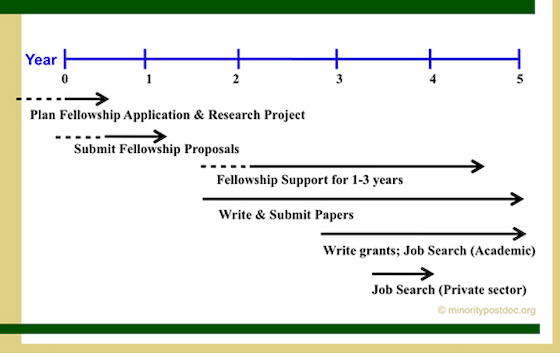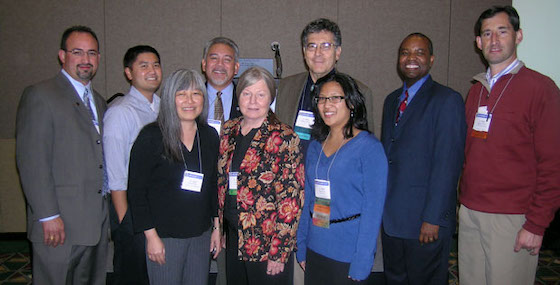Funding drives the success and stability of a postdoctoral experience. A prospective postdoc benefits from thorough planning since when monies run out, there are no graduate student-like funding mechanisms to act as a safety net, e.g. teaching assistant positions. Furthermore, a 5-year time limit across all institutions where a postdoc trains can restrict the options in employment transitions. Thus, it suits a postdoc to have a basic understanding of the different funding mechanisms available.
Independent Fellowships vs. Advisor’s Grant Funding
Many postdocs can rely on funding from an advisor's grants. However, a fellowship allows the independence to nurture your own research goals. In fact, the fellowship award can be transferred to another institution if you can justify the need for a different advisor. Furthermore, a fellowship permits you to manage your time for activities such as career development, conferences, teaching, etc.In contrast to a grant, the prospective awardee is responsible for writing a fellowship research proposal. This important professional exercise can focus your plan for experiments and scholarship, thereby creating an opportunity for clear communication with your postdoc advisor. These conversations place you in the driver's seat, navigating and controlling your career's course, rather than being a passenger in the advisor's trip towards their research goal. Having such an early conversation about project ownership will also pay off toward the end of your postdoc training when negotiating what you want to take with you (such as results, materials, and projects) to your next position.
Note a crucial caveat about the postdoc experience and independent fellowships. Postdocs are formally trainees (like students) but frequently considered as paid researchers (like employed staff) for the purpose of receiving your institution's Human Resource office benefits (such as a paycheck). However, some independent fellowships require that the individual not be classified as an "employee" as a condition of receiving the award. This can have serious implications for losing employee-like benefits especially health insurance, vacation time, and retirement plans. Institutions are making progress toward remedying this situation so check with the postdoc office administrator about the relevant policies. This concern should be worked out since it is better to obtain your own funding than to be dependent upon your advisor's grant. Establishing a successful track record of independent funding will serve you well in your career.
Majority vs. Minority Fellowships
Majority fellowships, such as the National Institutes of Health (NIH) Ruth Kirschstein/F32 awards, have large applicant pools leading to low awards rates and, therefore, the impression of great prestige to the recipients. By the nature of their targeted populations, minority/diversity fellowships do not have such cachet. However, minority fellowships are just as financially rewarding and often include more mentoring and career development opportunities due to their mission of diversifying the scientific enterprise. For example, many of the general fellowships (see Resources page) hold an annual meeting for awardees that include career advice workshops and networking with faculty to help in your job search.The Application Process
A postdoc experience usually begins right after your Ph.D. thesis is defended (see Figure). Thus, securing an independent fellowship to begin at the same time as your postdoc project can be quite a challenge since you would be writing your thesis and fellowship applications at the same time (not to mention submitting your papers for publication). To alleviate the pressure, one approach is to negotiate an initial 6 to 12 months of funding from your postdoc advisor's grants to buy you time to apply for fellowships funds during your first year. In this circumstance, prospective postdocs in biomedical fields can use the NIH Diversity Supplements to their advantage in the following manner. Search the NIH RePORTER database (formerly CRISP database) to find potential postdoc advisors who have active NIH R01 research grants with at least 2 years of funding left. In general, such grants are eligible for an additional supplement to pay for one postdoc in that research group. When interviewing for that postdoc position, describe this opportunity to the potential advisor to increase your marketability. While these supplements are technically not independent fellowships, you could treat it as such by writing the application yourself.Knowing the general fellowship application timeline will allow you to plan accordingly. For the most part, applications are due in late fall or early winter. Review committees make decisions over the winter with awards announced by late spring so that training can begin by the summer. Applications for the different fellowships require similar materials. Issues to consider are the following:
- The research proposal needs to be clear, feasible, and convey an enthusiasm for scholarship. For specific proposal writing tips, read materials such as Dr. Gayle Slaughter's 2006 book Beyond the Beakers.
- The personal statement and training plan must emphasize a long-term academic career goal and a commitment to the diversity mission of the respective fellowships.
- The training environment and the advisor’s track record with former postdocs should be a good fit for your success with this fellowship award. In particular, did former postdocs publish and attain employment especially as principal investigators? Note that a selection committee wants to see career growth so they do not look favorably upon applicants who stay within their graduate thesis topic. Along similar lines, do not choose your graduate advisor for your postdoc training.
- A curriculum vitae should demonstrate a productive graduate experience via peer-reviewed, first-author publications.
- A thesis work summary should express mastery of a model system, technique, research area, etc. This will establish the foundation upon which your research proposal is judged.
- Strong letters of recommendation (usually 3 to 4) should come from your postdoc advisor (required), thesis advisor, thesis committee members, or scientific collaborators. Sometimes finishing your graduate work will strain the relationship with your thesis advisor leading to the risk that their recommendation letter will not be strong and positive. In this scenario, consider not requesting a recommendation from your advisor. However, it is then imperative that a stellar, supportive letter comes from a thesis committee member who can explain the situation.
Most fellowships last 1 to 2 years with some programs offering a third year of funding under a competitive renewal process. Note that the Ford Foundation Fellowships are an exception with only one year of funding. Multi-year fellowships will request annual progress reports so work hard, generate results, and document productivity by presenting at conferences and publishing papers.
Finally, you can receive more information at the Postdoc Opportunities career development panel organized by the Postdoc Committee and held annually at the SACNAS Conference since 2003. Attendees will learn about the different diversity postdoctoral fellowships and can network with award recipients as well as fellowship program officers (see Photo).
For a roster of diversity fellowships available, please visit the Resources page

Figure: General postdoc career milestones. Original design and information for this figure came from a slide figure developed by Dr. Trevor Penning, Director of the Center of Excellence in Environmental Toxicology and a professor in the Department of Pharmacology, Biochemistry & Biophysics at the University of Pennsylvania School of Medicine.

Photo: Speakers from the 2008 Postdoc Opportunities panel are the following (left to right): Roberto Aguilar (University of California, Irvine), Christian Dimaano (Myriad Genetics), Leslie Pond (Novartis), Michael Sesma (NIH NIMH), Judith Nyquist (NRC/Ford), Cliffton Poodry (NIH NIGMS), Meda Higa (IRACDA, University of Pennsylvania), Andrew T. Austin-Dailey (American Psychological Association), and David Vigerust (Vanderbilt University)
A.I. Roca (2020) Diversity Funding for Your Postdoctoral Research: Advice for a Successful Experience. DiverseScholar 11:2
Ivonne Vidal Pizarro, Ph.D., contributed to this article. Thanks to Phoebe S. Leboy, Ph.D., for helpful comments. Dr. Alberto I. Roca organized the Minority Postdoc Summit at the 2004 SACNAS conference where he and Dr. Vidal Pizzaro met. Alberto founded the SACNAS Postdoc Committee and created the web portal Minoritypostdoc.org.
A shorter version of this article first appeared in the Summer/Fall 2009 print issue of the SACNAS News newsletter. This article is used with the permission of SACNAS.
Originally published online 23-Aug-2009
